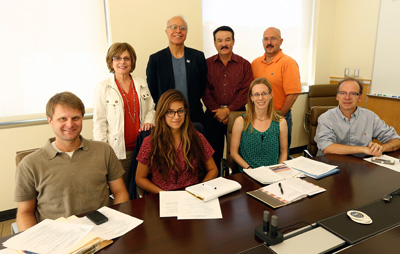By Nadia M. Whitehead
UTEP News Service
A team of interdisciplinary faculty members at The University of Texas at El Paso has been awarded $225,000 from the National Institutes of Health (NIH) to plan a new initiative that develops opportunities for mentoring and biomedical and health research for minority undergraduate students. Only 15 grants were awarded nationwide.
The UTEP team developing the plan consists of seven investigators: Renato Aguilera, Ph.D., professor of biological sciences; Thomas Boland, Ph.D., professor of biomedical engineering; Tim Collins, Ph.D., and Sara Grineski, Ph.D., associate professors of sociology and anthropology; Lourdes Echegoyen, Ph.D., director of the Campus Office of Undergraduate Research Initiatives; Osvaldo Morera, Ph.D., professor of psychology; and Homer Nazeran, Ph.D., professor of electrical and computer engineering.
Known as NIH’s Building Infrastructure Leading to Diversity (BUILD), the initiative aims to drastically diversify the workforce in the biomedical, behavioral, clinical and social sciences.
“There have been a number of historically funded programs whose impact has been excellent, but at a small scale and very localized,” Echegoyen said. “The NIH doesn’t just want to have a few token success stories about minorities in the sciences and engineering. They want to transform how it’s being done to achieve a minority representation that is parallel to that of the U.S. population.”
Over the course of the next six months, the UTEP team will design BUILDing SCHOLARS (Building Infrastructure Leading to Diversity: Southwest Consortium of Health-Oriented education Leaders and Research Scholars), with a final goal of creating a multi-institution consortium to train the next generation of minority biomedical, social, clinical and behavioral science and engineering researchers.
By partnering with a multitude of Southwest institutions, including the University of New Mexico, Arizona State University and UT Southwestern Medical Center, the team plans to collaborate to develop a highly effective program.
“Our concept is very regional,” Echegoyen said. “We’d like to create a network of partners in the Southwest to bring students from high schools and community colleges into research universities, and get them rigorously trained as undergraduate and graduate researchers so that they eventually become professionals capable of effectively competing for NIH grants.”
At the end of the six-month planning period, the UTEP researchers will submit their full proposal to the NIH. If awarded, they will receive a multimillion-dollar grant to carry out BUILDing SCHOLARS.
Nancy Street, Ph.D., associate dean of UT Southwestern’s Graduate School of Biomedical Sciences, said she looked forward to working with UTEP on the endeavor.
“We plan to invest both our time and resources into helping develop the UTEP BUILD students into budding research scientists who are equipped with the knowledge and research skills necessary to move forward in the exhilarating but demanding field of basic science research,” Street said.
Representatives from all partnering institutions will convene at a strategic planning conference at UTEP in early January to outline the training and mentoring program activities, in addition to developing the first draft of the proposal.
